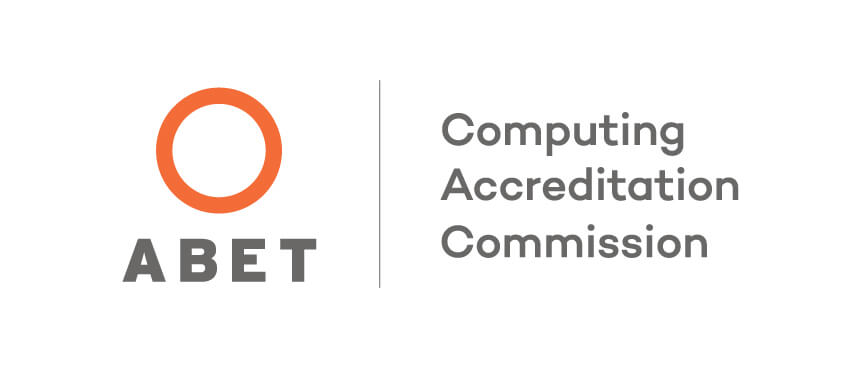Accreditation and Certifications

The BS program in Computer Science is accredited by the Computing Accreditation Commission of ABET, abet.org
The ABET accreditation process, a voluntary, non-governmental process of peer review, helps assure quality in educational programs. ABET-accredited educational programs must meet certain defined standards. The computer science department's Bachelor of Science in Computer Science degree program is accredited by the Computing Accreditation Commission of ABET, abet.org. The accreditation is based on both the computer science curriculum and the process management used within the department for assessment and improvement.
Enrollment and Graduation Data
Undergraduate, Graduate and Research Objectives
Mission
To create and convey knowledge in computer science through innovative research and education, and solve technological and societal problems through computing to improve the living experience of citizens in Missouri and beyond.
Undergraduate Educational Objectives for Graduates of the Department of Computer Science 3-5 years after graduation Current Objectives as of 2014:
To fulfill this mission, the Computer Science Department strives for excellence in producing graduates who will:
- Strengthen core computer science competencies while inventing and embracing new processes and technology that can be applied to both computer science and interdisciplinary endeavors.
- Grow effective communication, collaboration, and leadership skills that result in strong working relationships and high-performance work environments.
- Apply sound judgment to the business, societal, ethical, and professional issues of the rapidly evolving computing industry.
- Contribute to the greater good of their communities through professional involvement, writing, speaking, and mentoring.
Graduate Educational Objectives for Graduates of the Department of Computer Science 2011:
To fulfill this mission, the Computer Science Department strives for excellence in producing graduates who are well-rounded, grounded individuals with:
- Knowledge Advancing and Understanding: Strong understanding of the state of the art in advanced work with a contribution that clearly advances the state of the art.
- Critical Thinking: Produce original contributions with documented impact and clear objectives.
- Communication: The ability to communicate effectively using both written and oral communication,
- Professional Development: An awareness and understanding of the professional, societal, and ethical issues of the rapidly evolving computing industry and the judgment to apply this understanding.
Research Objectives for Department of Computer Science 2011:
Become internationally known in the areas of:
- Critical infrastructure protection,
- Pervasive and mobile computing, and
- Software engineering.
Please address comments on these objectives to csdept@mst.edu
Undergraduate Educational Outcomes for Graduates of the Computer Science Department
Current Outcomes as of the 2020-2021 school year:
Graduates of the program will have an ability to:
- Analyze a complex computing problem and to apply principles of computing and other relevant disciplines to identify solutions.
- Design, implement, and evaluate a computing-based solution to meet a given set of computing requirements in the context of the program’s discipline.
- Communicate effectively in a variety of professional contexts.
- Recognize professional responsibilities and make informed judgments in computing practice based on legal and ethical principles.
- Function effectively as a member or leader of a team engaged in activities appropriate to the program’s discipline.
- Apply computer science theory and software development fundamentals to produce computing-based solutions.
Please address comments on these outcomes to csdept@mst.edu
National Security Certifications
Missouri S&T was among the first universities in the country to be designated a National Center of Academic Excellence in Information Assurance Research (CAE-R). This prestigious national certification is jointly sponsored by the National Security Agency (NSA) and Department of Homeland Security (DHS).
The goal of the program is to proactively increase our understanding of robust IA technology, policy, and practices that will enable our nation to effectively prevent and respond to a catastrophic cyber event. This program will contribute significantly to the advancement of state-of-the-art IA knowledge and practice.
Missouri S&T is recognized as a school with programs that integrate research activities into the curriculum and into the classroom setting. As an IA research center, Missouri S&T will have the opportunity to drill deeper into much needed solutions for securing critical information systems and networks. This certification will build closer ties with the NSA, DHS, and other federal agencies with insight into academic IA programs - and reach into industry - that can support advanced academic, research, and development capabilities. The certification also allows Missouri S&T to participate in government-academia researcher exchanges.
This certification adds to Missouri S&T’s certification as a National Center of Academic Excellence in Information Assurance Education.
NSA certification good through 2024.

Follow Computer Science